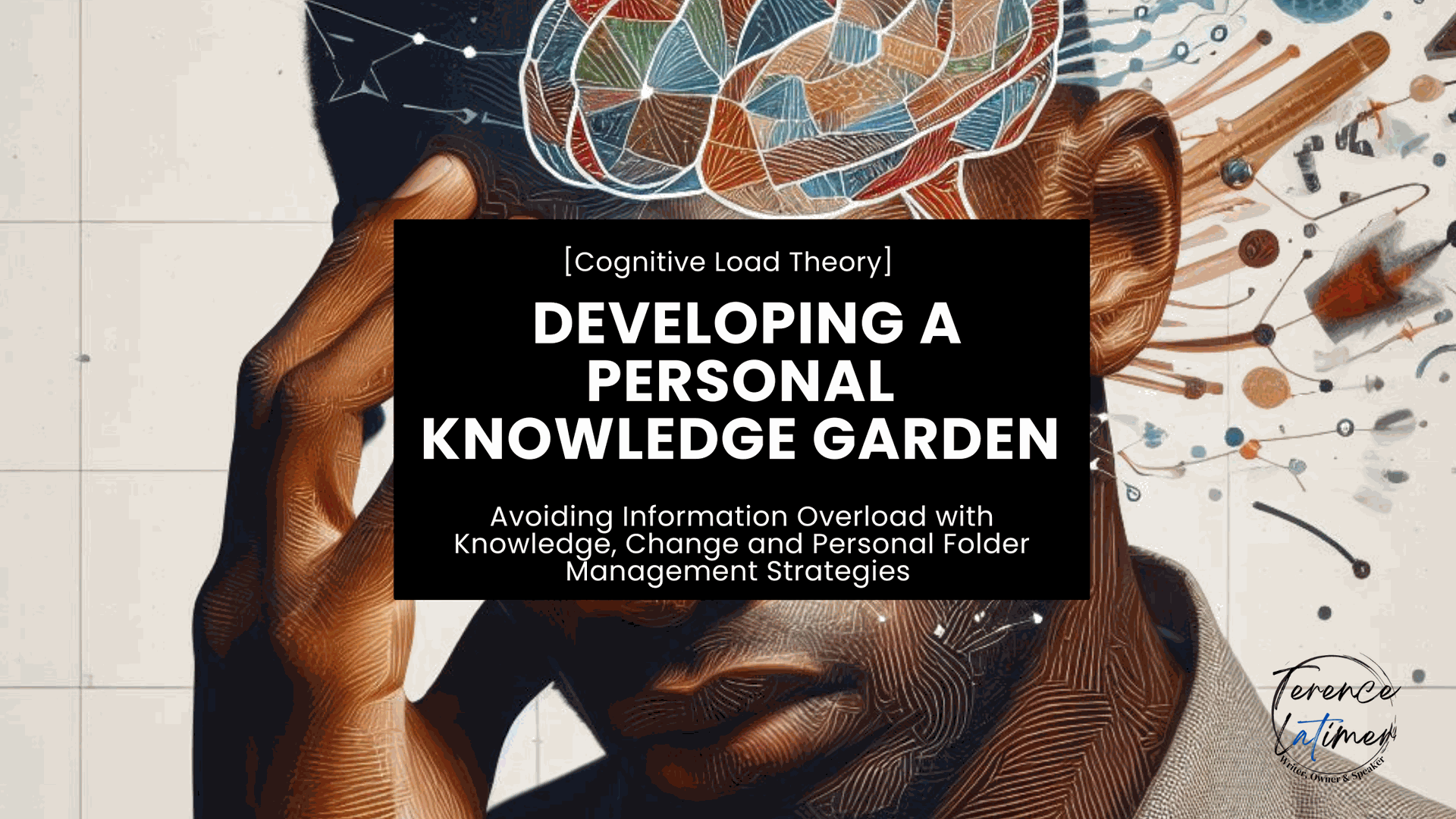
Looking to Organize Your Brilliant Ideas Without Getting Lost in a Sea of Data?
I Offer Virtual Coaching and Digital Audits Powering Productive Professionals
TL;DR: In summary, this post offers insights into effective personal development through systematic planning, specialized note-taking, disciplined organization, and the mindful management of information and knowledge.
Introduction: What Is Cognitive Load Theory?
Research on cognitive load theory has found that emotions can interfere with information processing. Being stressed or anxious limits the capacity of your working memory, which in turn, makes learning or performing a new task more difficult. This post highlights the value of Information Architecture and the Development of a Personal Knowledge Management system.
Knowledge Management: According to Wikipedia and ChatGPT
In creating this section of the post, I've prompted ChatGPT's 'Data Analysis' tool to summarize a block of text generated by Wikipedia, based on the "Knowledge Management" article.
Knowledge Management (KM) involves methods for creating, sharing, and managing an organization's knowledge to meet goals effectively. A multidisciplinary field established in 1991, it is taught in business, information systems, and library sciences, among others. Many companies and organizations integrate KM into their strategies, focusing on objectives like performance improvement, innovation, and knowledge sharing. KM, distinct from but related to organizational learning, is increasingly complex in transorganizational contexts, especially with challenges posed by industry 4.0 and digital transformation.
Cognitive Load Theory: Why Your Brain Needs a ‘Desktop Cleanup'
Aytekin Tank, CEO of Jotform, dove into the topic of Cognitive Load Theory on Medium.
Cognitive load theory says that optimal learning occurs when your working memory, which deals with new information and has a limited capacity, is not overly taxed. We have trouble learning and performing new tasks if our minds are trying to process too much information at once. For example, if you’re trying to master a new recipe while surrounded by distractions.
As part of some broader lessons I've had regarding information architecture, and the information, knowledge and wisdom I'm responsible for, I've worked over the past several years to create a personal strategy to ensure I could skillfully be aware of what required my most powerful thinking, and mindfully able to manage projects which require working with others.
If you feel like your organization's knowledge is scattered and inaccessible, I would encourage you to keep reading.
We'll consider items as they relate to personal and professional knowledge management systems and how they impact your brain's ability to comprehend the information you're asking it to.
This is particularly relevant if you're:
- Drowning in a sea of data
- Struggling to find the information you need when you need it
Cognitive Load Theory + Personal Knowledge Management
Developing empathy for the way you learn, or understand information, has for me, come in the form of learning about personal knowledge management.
Through some of the discovery work I've done this year, I've come to discover a topic known as Information Architecture.
My lessons this year have taught me how Information architecture (IA) can be challenging, albeit necessary, solution to managing knowledge management. Bound and encouraged by the vast amount of information available today, my focus in the practice has come in the desire to identify ways to ensure content is easy to find, navigate, and understand.
User Experience Design and Complex Systems have taught me that empathy for users begins and ends with understanding their "Journey."
By empathetically understanding the challenges, and visualizing potential paths, your end user, or reader, has to discover your information and knowledge means providing familiarity and coherence across multiple interaction channels, from the web to smartphones, smartwatches, and beyond.
From the book, Information Architecture: For the Web and Beyond:
To guide you through this broad ecosystem, this popular guide - now in its fourth edition - provides essential concepts, methods, and techniques for digital design that have withstood the test of time. UX designers, product managers, developers, and anyone involved in digital design will learn how to create semantic structures that will help people engage with your message.
Jorge Argano, one of the authors of the book, has been a Subject Matter Expert I've enjoyed learning from since completing the book.
Argano describes his process as developing a Personal Knowledge Garden. I look forward to taking one of his courses one day, and will continue to engage with his content across social media and in print.
The analogy of a "Knowledge Garden," has helped to conceptualize the Information I'm most interested in, as well as helped to define new levels of freedom as it relates to organizing and structuring information.
I've spent the best part of this year learning more about the topic, using lessons from podcasts, e-books, and courses, to develop a productivity system rooted in my structure and process as a writer.
I discuss some of those lessons on YouTube and Medium. If you're interested in learning more, I recommend getting started with the clip below.
In the video, we dive deep into the world of information architecture and how it can be your ultimate tool for:
- Battling cognitive overload
- Streamlining knowledge management systems
- Fostering shared understanding across your organization
Lessons learned have come in the form of:
- The Importance of Documentation
- Chunking Content
- Content Planning
- Internal and External Content
- Folder and File Management
- Hierarchy, Grouping and Couplings
- Defining Terms and Topics
- The Importance of Document Descriptions
- User Levels, Access, and Permissions
If that clip was interesting to you, then you might be more advanced and ready to develop structure for your business by getting more confident: How Maximizing Information Architecture Will Save You Time, Money, Energy, and Attention

This post, is an expanded version of an article I've published on Medium. Exclusive to Medium, Systems Planning For Personal Development focuses on the importance of personal knowledge management in dealing with information overload.
In the post, I advocate for the use of systems and routines to manage life's responsibilities and tasks effectively. I emphasize the need for identifying opportunities for improvement, sunsetting outdated processes, and analyzing life data both qualitatively and quantitatively.
We dive deeper into the topic of cognitive load theory and the importance of developing tools and rules to navigate systems and processes. I stress the value of accountability in ensuring your tools achieve desired results.
When it comes to building systems, "A hammer is only as good as the builder." The post also dives into the challenges of managing different personas and roles in life, including work-life balance concepts associated with your career, travel, and personal relationships. The concept of a "Second Brain" is introduced, representing a system to consolidate and manage information overload.
The post discusses the importance of being mindful of how much information one is responsible for and the need to balance strategic planning with responsive behavior to changing conditions.
You'll also learned a disciplined approach to organizing notes, projects, and plans, including the role feedback provides in personal development.
Key Takeaways:
- Learn how effective information organization can help you regain control over your data.
- Discover the secrets to managing knowledge efficiently and boosting productivity.
- Uncover the power of a shared organizational dictionary for seamless collaboration.

Terence Latimer is an Information Communications & Technology professional, consultant, and entrepreneur based in the Mojave Desert.
I write about my experience in startups, tech, and the art of business. I’m also the Founder of Food Tribe, a socially conscious restaurant review platform.
Follow me on Instagram or LinkedIn. Feel free to subscribe to my newsletter here.